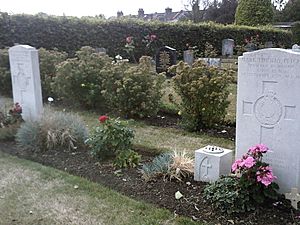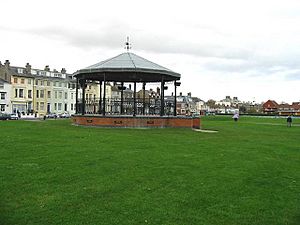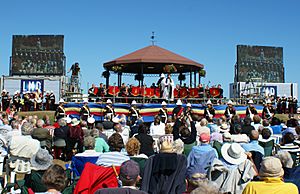Deal barracks bombing facts for kids
Quick facts for kids Deal barracks bombing |
|
|---|---|
| Location | Royal Marine barracks, Deal, Kent, England |
| Coordinates | 51°12′49″N 1°24′0″E / 51.21361°N 1.40000°E |
| Date | 22 September 1989 08:22 (GMT) |
| Attack type | Time bomb |
| Deaths | 11 Royal Marines |
| Injured | 21 Royal Marines |
| Perpetrator | Provisional IRA |
The Deal barracks bombing was a terrible attack that happened on 22 September 1989, in Deal, Kent, England. It was carried out by a group called the Provisional Irish Republican Army (IRA). They used a time bomb at the Royal Marines School of Music building. The explosion caused the building to collapse, sadly killing 11 musicians from the Royal Marines Band Service and injuring 21 others.
Contents
What Was the Royal Marines School of Music?
The Royal Marines School of Music is a special place where musicians for the Royal Marines Band Service are trained. These bands are the musical part of the Royal Navy. The school started in Portsmouth in 1930 and moved to Deal in 1950. In 1989, it was still part of the Royal Marine base in Deal.
During the 1980s, the IRA was involved in a campaign against targets in Britain and Northern Ireland. Their main goal was to separate Northern Ireland from the rest of the United Kingdom. They had carried out other attacks, including an attempt to harm the British Prime Minister Margaret Thatcher in 1984. They also carried out a similar attack on a military band in London in 1982.
The Day of the Explosion
On 22 September 1989, at 8:22 in the morning, a bomb weighing about 7 kilograms exploded. It went off in a changing room at the Royal Marines School of Music. The blast completely destroyed the recreational centre and flattened the three-storey building next to it where people lived. It also caused a lot of damage to the rest of the base and homes nearby.
The explosion was so loud it could be heard several kilometres away. Windows in the centre of Deal shook, and a huge cloud of smoke rose over the town. Most of the musicians who lived in the building had already woken up. They were practicing marching on the parade ground when the bomb went off. These marines saw the buildings fall down, and many of the teenagers were in shock for days.
Some marines were still inside the building when the bomb exploded. They were hit by the full force of the blast. Many were trapped in the fallen rubble for hours. Heavy lifting equipment from the military was needed to clear the debris. The Kent Ambulance Service even stopped their strike to help those who were hurt.
Ten marines died right away at the scene, most of them trapped in the collapsed building. One body was later found on the roof of a nearby house. Another 21 people were seriously injured and were taken to hospitals in Dover, Deal, and Canterbury. One of these men, 21-year-old Christopher Nolan, sadly died from his injuries a few weeks later. Three of those who died were buried nearby at the Hamilton Road Cemetery, Deal. The names of the victims were: Msn Mick Ball, 24; Msn Andy Cleatheroe, 25; Msn Trevor Davis, 39; Msn Richard Fice, 22; Msn Richard "Taff" Jones, 27; Band Cpl David "Mac" McMillan, 26; Msn Christopher Nolan, 21; Band Cpl Dean Pavey, 31; Msn Mark Petch, 26; Msn Tim Reeves, 24; and Msn Bob Simmonds, 34.
How People Reacted
The IRA said they were responsible for the bombing. They stated it was part of their campaign to remove British troops from Northern Ireland. Many British people were very shocked by the attack. It was carried out on a military band whose training was mostly about saving lives, not fighting. People were also shocked by how young some of the victims were, as many were new recruits.
The British Government also strongly spoke out against the IRA's attack. Prime Minister Margaret Thatcher was in Moscow at the time. She said she was "shocked and extremely sad." The leader of the opposition, Neil Kinnock, called the attack an "awful atrocity." He said that even those who supported the IRA's cause must be sickened by such violence.
The head of the Royal Marines, Lieutenant-General Sir Martin Garrod, spoke on television. He called the bombers "thugs, extortionists, torturers, murderers and cowards – the scum of the earth." He added that the Royal Marines would become "stronger and more determined than ever before."
There was some discussion about the base's security because a private company was partly in charge of it. This led to a full review of security at all British military bases. The private security guards at Deal were replaced with Royal Marine guards.
One week after the bombing, the staff and students of the School of Music marched through Deal. Thousands of people watched and clapped. They left gaps in their ranks to show where those who had died or were seriously injured would have been. A special memorial bandstand was built at Walmer Green. It was built to remember those who "only ever wanted to play music." A memorial inside the Deal Barracks chapel was destroyed when the building burned down in 2003. However, that spot is now a memorial garden. The remaining barracks at Deal were turned into flats in 1996. The School of Music is now back in Portsmouth.
Every year, the Royal Marines Band from Portsmouth visits the memorial bandstand in Deal. They go to pay their respects to those who died in the bombing. In July 2009, a memorial concert and re-dedication ceremony took place at the bandstand. Thousands of people attended. In 2019, which was the 30th anniversary of the bombing, over 12,000 people came to the event.
Today, Deal Parochial Church of England School stands where the barracks' Drill Fields used to be. A large carved stone with the Globe and Laurel, which is the Royal Marines' emblem, sits at the school's entrance. This stone was originally on one of the buildings at the barracks. On 22 September 2015, the 26th anniversary of the bombing, the school held a special service. This was after their Year 6 pupils helped restore the stone. The service honored the Royal Marines' role in the town.
Sadly, no one has ever been arrested or found guilty in connection with the Deal bombing.
More to Explore
- Timeline of the Northern Ireland Troubles
- Timeline of Provisional Irish Republican Army actions
- List of unsolved murders in the United Kingdom (1980s)




